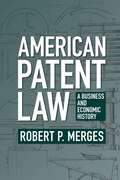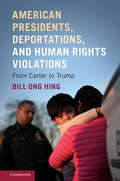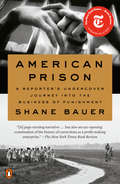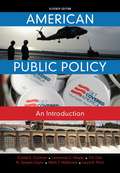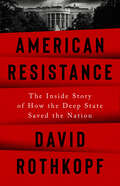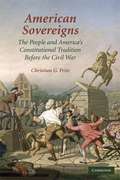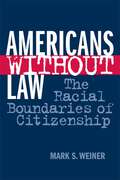- Table View
- List View
American Nuremberg: The U.S. Officials Who Should Stand Trial for Post-9/11 War Crimes
by Rebecca GordonAmerica goes on trial for war crimes in this persuasively argued book from the author of Mainstreaming Torture. In the aftermath of 9/11, the Bush administration initiated a war on terror that systematically violated international law. In the name of national security, the United States government established secret detention centers (aka “black sites”) and carried out torture, extraordinary rendition, drone assassinations, and massive surveillance of its own citizens. Though there is overwhelming evidence of these human rights violations, no action has been taken to pursue justice for the victims. No high US official has been charged for enacting these policies, considered by legal experts around the world to be war crimes. Between 1945 and 1949, the United States and its allies put nearly two hundred Nazi war criminals on trial, a towering political achievement that established the legitimacy of international law. Philosopher and ethicist Rebecca Gordon argues that America must now either apply the same principles to its own officials or risk undoing its legacy as leader of the free world. In American Nuremberg, she not only makes a compelling case for the prosecution, but also lays out the legal groundwork that would make such a tribunal possible in our time.
American Oligarchs: The Kushners, The Trumps, And The Marriage Of Money And Power
by Andrea BernsteinA multigenerational saga of two families, who rose from immigrant roots to the pinnacle of wealth and power, that tracks the unraveling of American democracy. <P><P>In American Oligarchs, award-winning investigative journalist Andrea Bernstein tells the story of the Trump and Kushner families like never before. Their journey to the White House is a story of survival and loss, crime and betrayal, that stretches from the Klondike Gold Rush, through Nazi-occupied Poland and across the American Century, to our new gilded age. In building and maintaining their dynastic wealth, these families came to embody the rising nationalism and inequality that has pushed the United States to the brink of oligarchy. <P><P>Building on her landmark reporting for the acclaimed podcast Trump, Inc. and The New Yorker, Bernstein’s painstaking detective work brings to light new information about the families’ arrival as immigrants to America, their paths to success, and the business and personal lives of the president and his closest family members. <P><P>Bernstein traces how the two families ruthlessly harnessed New York and New Jersey machine politics to gain valuable tax breaks and grew rich on federal programs that bolstered the middle class. She shows how the Trump Organization, denied credit by American banks, turned to shady international capital. She reveals astonishing new details about Charles Kushner’s attempts to ensnare his brother-in-law with a prostitute and explores how Jared Kushner and his father used a venerable New York newspaper to bolster their business empire. <P><P>Drawing on more than two hundred interviews and more than one hundred thousand pages of documents, many previously unseen or long forgotten, Bernstein shows how the Trumps and the Kushners repeatedly broke rules and then leveraged secrecy, intimidation, and prosecutorial and judicial power to avoid legal consequences. <P><P>The result is a compelling narrative that details how the Trump and Kushner dynasties encouraged and profited from a system of corruption, dark money, and influence trading, and that reveals the historical turning points and decisions—on taxation, regulation, white-collar crime, and campaign finance laws—that have brought us to where we are today. <P><P><b>A New York Times Bestseller</b>
American Patent Law: A Business and Economic History
by Robert P. MergesStudents and established scholars of intellectual property law often look for historical context when trying to understand the development and present-day contours of IP rules and systems. American Patent Law supplies this context, offering readers a comprehensive account of the evolution of the US patent system and patent doctrine beginning in 1790. From the technologies for harvesting wood and shoemaking in the earliest periods to computer software and biotechnology of the present, each chapter of the book covers the characteristic technologies of each historical era. The book also describes how businesspeople in each era acquired and enforced patents and used patents as the foundation of various business arrangements. This book is a landmark in the history of technologies, the US patent system, and the way private actors have deployed patents across American history.
American Pentimento: The Invention of Indians and the Pursuit of Riches (Public Worlds #7)
by Patricia SeedThe modern regulations and pervading attitudes that control native rights in the Americas may appear unrelated to the European colonial rule, but traces of the colonizers' cultural, religious, and economic agendas remain. Patricia Seed likens this situation to a pentimento - a painting in which traces of older compositions become visible over time -and shows how the exploitation begun centuries ago continues today. Seed examines how the goals of European colonialist in the Americas. The English appropriated land, while the Spanish and Portuguese attempted to eliminate "barbarous" religious behavior and used indigenous labor to take mineral resources. Ultimately, each approach denied native people distinct aspects of their heritage. Seed argues that their differing effects persist, with natives in former English colonies fighting for land rights, while those in former Spanish and Portuguese colonies fight for human dignity.
American Presidential Power and the War on Terror: Does The Constitution Matter?
by Justin DePlatoThis book examines the use of presidential power during the War on Terror. Justin DePlato joins the debate on whether the Constitution matters in determining how each branch of the federal government should use its power to combat the War on Terror. The actions and words of Presidents George W. Bush and Barack Obama are examined. DePlato's findings support the theory that executives use their own prerogative in determining what emergency powers are and how to use them. According to DePlato, the Presidents argue that their powers are implied in Article II of the Constitution, not expressed. This conclusion renders the Constitution meaningless in times of crisis. The author reveals that Presidents are becoming increasingly cavalier and that the nation should consider adopting an amendment to the Constitution to proffer expressed executive emergency powers.
American Presidents, Deportations, and Human Rights Violations: From Carter to Trump
by Bill Ong HingOf the many issues polarizing societies today, immigration is one of the most contentious. In the United States, as in Europe, immigration was a defining issue in recent national elections. Immigration not only involves government policies but also the human rights of millions of people. American Presidents, Deportations, and Human Rights Violations studies how recent immigration policies in the United States developed during the Obama administration and are now being expanded in the first months of the Trump presidency. Documenting the harsh treatment of immigrants over the past twenty years, Bill Ong Hing shows how mass detention and deportation of immigrants, from Clinton's two terms and the Bush administration, have escalated even higher. This book questions what price the United States is willing to pay for such harsh immigration policies in terms of our national values, and the impact on the lives of the millions of immigrants who deserve the full protection of universal human rights obligations.
American Prison: A Reporter's Undercover Journey into the Business of Punishment
by Shane BauerA ground-breaking and brave inside reckoning with the nexus of prison and profit in America: in one Louisiana prison and over the course of our country's history. <p><p> In 2014, Shane Bauer was hired for $9 an hour to work as an entry-level prison guard at a private prison in Winnfield, Louisiana. An award-winning investigative journalist, he used his real name; there was no meaningful background check. Four months later, his employment came to an abrupt end. But he had seen enough, and in short order he wrote an exposé about his experiences that won a National Magazine Award and became the most-read feature in the history of the magazine Mother Jones. Still, there was much more that he needed to say. <p> In American Prison, Bauer weaves a much deeper reckoning with his experiences together with a thoroughly researched history of for-profit prisons in America from their origins in the decades before the Civil War. For, as he soon realized, we can't understand the cruelty of our current system and its place in the larger story of mass incarceration without understanding where it came from. Private prisons became entrenched in the South as part of a systemic effort to keep the African-American labor force in place in the aftermath of slavery, and the echoes of these shameful origins are with us still. <p> The private prison system is deliberately unaccountable to public scrutiny. Private prisons are not incentivized to tend to the health of their inmates, or to feed them well, or to attract and retain a highly-trained prison staff. Though Bauer befriends some of his colleagues and sympathizes with their plight, the chronic dysfunction of their lives only adds to the prison's sense of chaos. To his horror, Bauer finds himself becoming crueler and more aggressive the longer he works in the prison, and he is far from alone. <p> A blistering indictment of the private prison system, and the powerful forces that drive it, American Prison is a necessary human document about the true face of justice in America.
American Privacy: The 400-year History of Our Most Contested Right
by Frederick S. LaneA page-turning narrative of privacy and the evolution of communication, from broken sealing wax to high-tech wiretapping.
American Property: A History of How, Why, and What We Own
by Stuart BannerIn America, we are eager to claim ownership: our homes, our ideas, our organs, even our own celebrity. But beneath our nation's proprietary longing looms a troublesome question: what does it mean to own something? More simply: what is property? The question is at the heart of many contemporary controversies, including disputes over who owns everything from genetic material to indigenous culture to music and film on the Internet. To decide if and when genes or culture or digits are a kind of property that can be possessed, we must grapple with the nature of property itself. How does it originate? What purposes does it serve? Is it a natural right or one created by law? Accessible and mercifully free of legal jargon, American Property reveals the perpetual challenge of answering these questions, as new forms of property have emerged in response to technological and cultural change, and as ideas about the appropriate scope of government regulation have shifted. This first comprehensive history of property in the United States is a masterly guided tour through a contested human institution that touches all aspects of our lives and desires.
American Public Policy: An Introduction (11th Edition)
by N. Joseph Cayer Lawrence C. Mayer Clarke E. Cochran T. R. Carr Mark McKenzieAMERICAN PUBLIC POLICY: AN INTRODUCTION engages students with a unique emphasis on specific, substantive issues of public policy. It also kindles discussion that helps make public policy personal as students apply their knowledge to real-life policies. The authors present policy material step-by-step-explaining each policy’s historical context, building a picture of the existing policy, and prompting students to evaluate and discuss possible alternatives. This new edition includes updated and expanded coverage on key policy issues, including immigration, unemployment insurance, gun control, and the Affordable Care Act.
American Radical: Inside the World of an Undercover Muslim FBI Agent
by Kevin Maurer Tamer Elnoury<P>The explosive memoir of a Muslim American FBI agent fighting terror from the inside. <P>It’s no secret that federal agencies are waging a broad, global war against terror. But for the first time in this memoir, an active Muslim American federal agent reveals his experience infiltrating and bringing down a terror cell in North America. <P>A longtime undercover agent, Tamer Elnoury joined an elite counterterrorism unit after September 11. Its express purpose is to gain the trust of terrorists whose goals are to take out as many Americans in as public and as devastating a way possible. It's a furious race against the clock for Tamer and his unit to stop them before they can implement their plans. Yet as new as this war still is, the techniques are as old as time: listen, record, and prove terrorist intent. <P>Due to his ongoing work for the FBI, Elnoury writes under a pseudonym. An Arabic-speaking Muslim American, a patriot, a hero: To many Americans, it will be a revelation that he and his team even exist, let alone the vital and dangerous work they do keeping all Americans safe.
American Reckoning: Inside Trump's Trial—and My Own
by Jonathan AlterA vivid eyewitness account of the historic first criminal trial of a president and a cri de coeur for democracy from a New York Times bestselling author and presidential historian.As one of a handful of journalists allowed in the courtroom, for 23 days Jonathan Alter sat just feet away from the most dangerous threat to democracy in American history, watching the spectacle of the century: the felony trial of Donald Trump. Highly publicized but untelevised and thus largely hidden from public view, this landmark trial offered hope of real justice amid a grueling eight-year national ordeal and foreshadowed the drama of the 2024 presidential election. Alter shares everything he witnessed—from eviscerating takes on the colorful characters to the chilling legal ups and downs—to offer a barbed account of the trial and its aftermath, including fresh reporting about the historic events of the summer of 2024. A Zelig of journalism experiencing a crisis of faith in the good sense of the American people, Alter chronicles the shaping of his political consciousness and his bracing, unpredictable relationships with Jimmy and Rosalynn Carter, Bill and Hillary Clinton, Barack Obama, John McCain, and Joe Biden, whose decision to stand down in favor of former prosecutor Kamala Harris put the criminal trial front and center as Americans rendered their own verdict at the polls. Deeply personal and passionate, American Reckoning is an eye-opening book from a journalist with a front row seat on history, offering a troubled yet hopeful look at our national moment of truth.
American Red: A Novel
by David MarlettA union boss goes on trial for murder at the dawn of the twentieth century in this acclaimed historical legal thriller based on true events. When the governor of Idaho is assassinated in 1905, Pinkerton detective James McParland pins the crime on William &“Big Bill&” Haywood, the powerful boss of the Western Federation of Miners. As the trial begins, America&’s most famous attorney, Clarence Darrow, leads the defense; a philandering US senator leads the prosecution; and the courtroom is crowded with press, gunhands, and spies. Among those present are two young idealists, Jack Garrett and Carla Capone—he a spy for the prosecution, she for the defense. As they discover unsettling truths about their employers, they begin to discover what they&’re willing to sacrifice for justice, honor, and a chance at love. &“American Red is an unflinching depiction of mine owners&’ pursuit of profit at the expense of miners&’ safety, unions&’ routine use of violence to make workers&’ voices heard, a police force&’s willingness to resort to kidnapping and subterfuge and a court system&’s tug of war over constitutional protections, compassion and fairness.&” —Historical Novel Society
American Resistance: The Inside Story of How the Deep State Saved the Nation
by David RothkopfIt could have been so much worse: a deeply reported, insider story of how a handful of Washington officials staged a daring resistance to an unprecedented presidency and prevented chaos overwhelming the government and the nation. Each federal employee takes an oath to &“support and defend the Constitution of the United States against all enemies foreign and domestic,&” but none had imagined that enemy might be the Commander-in-Chief. With the presidency of Donald Trump, a fault line between the president and vital forces within his government was established. Those who honored their oath of office, their obligation to the Constitution, were wary of the president and they in turn were not trusted and occasionally fired and replaced with loyalists. American Resistance is the first book to chronicle the unprecedented role so many in the government were forced to play and the consequences of their actions during the Trump administration. From Lt. Col. Alexander Vindman and his brother Yevgeny, to Ambassador Marie Yovanovitch, to Bill Taylor, Fiona Hill, and the official who first called himself &“Anonymous&”—Miles Taylor, among others, Rothkopf examines the resistance movement that slowly built in Washington. Drawing from first hand testimonies, deep background and research, American Resistance shows how when the President threatened to run amok, a few key figures rose in defiance. It reveals the conflict within the Department of Justice over actively seeking instances of election fraud and abuse to help the president illegally retain power, and multiple battles within the White House over the influence of Jared and Ivanka, and in particular the extraordinary efforts to get them security clearances even after they were denied to them. David Rothkopf chronicles how each person came to realize that they were working for an administration that threatened to wreak havoc – one Defense Secretary was told by his mother to resign before it was too late – in an intense drama in which a few good men and women stood up to the tyrant in their midst.
American Sanctuary: Mutiny, Martyrdom, and National Identity in the Age of Revolution
by A. Roger EkirchFrom “one of the most wide-ranging and imaginative historians in America today; there is no one else quite like him in the profession” (Gordon S. Wood)—a dazzling and original work of history. A. Roger Ekirch’s American Sanctuary begins in 1797 with the bloodiest mutiny ever suffered by the Royal Navy—on the British frigate HMS Hermione, four thousand miles from England’s shores, off the western coast of Puerto Rico. In the midst of the most storied epoch in British seafaring history, the mutiny struck at the very heart of military authority and at Britain’s hierarchical social order. Revolution was in the air: America had won its War of Independence, the French Revolution was still unfolding, and a ferocious rebellion loomed in Ireland, with countless dissidents already arrested. Most of the Hermione mutineers had scattered throughout the North Atlantic; one of them, Jonathan Robbins, had made his way to American shores, and the British were asking for his extradition. Robbins let it be known that he was an American citizen from Danbury, Connecticut, and that he had been impressed into service by the British. John Adams, the Federalist successor to Washington as president, in one of the most catastrophic blunders of his administration, sanctioned Robbins’s extradition, according to the terms of the Jay Treaty of 1794. Convicted of murder and piracy by a court-martial in Jamaica, Robbins was sentenced by the British to death, hauled up on the fore yardarm of the frigate Acasta, blindfolded with his hands tied behind his back, and hanged. Adams’s miscalculation ignited a political firestorm, only to be fanned by news of Robbins’s execution without his constitutional rights of due process and trial by jury. Thomas Jefferson, then vice president and leader of the emergent Republican Party, said, “No one circumstance since the establishment of our government has affected the popular mind more.” Congressional Republicans tried to censure Adams, and the Federalist majority, in a bitter blow to the president, were unable to muster a vote of confidence condoning Robbins’s surrender. American Sanctuary brilliantly lays out in full detail the story of how the Robbins affair and the presidential campaign of 1800 inflamed the new nation and set in motion a constitutional crisis, resulting in Adams’s defeat and Jefferson’s election as the third president of the United States. Ekirch writes that the aftershocks of Robbins’s martyrdom helped to shape the infant republic’s identity in the way Americans envisioned themselves. We see how the Hermione crisis led directly to the country’s historic decision to grant political asylum to refugees from foreign governments—a major achievement in fulfilling the resonant promise of American independence, as voiced by Tom Paine, to provide “an asylum for mankind
American Shield: The Immigrant Sergeant Who Defended Democracy
by Susan Shapiro Aquilino Gonell&“American Shield is an all-American tale of duty and determination—beautifully told by an immigrant, a veteran, and a patriot.&” —Nancy Pelosi, Speaker Emerita of the United States House of RepresentativesSet against the extraordinary events of January 6, 2021, Aquilino Gonell&’s inspirational memoir is rooted in the joys and struggles of the immigrant experience that have long defined the American experimentAquilino Gonell came to the United States from the Dominican Republic as a young boy. Although he spoke no English, he dedicated himself to his adopted land, striving for the American dream. Determined to be a success story, he joined the army to pay for college. He saw action in Iraq and returned home with PTSD. Believing in the promise of our government, he focused on healing himself and supporting his family. His hard work paid off when he landed a coveted position with the United States Capitol Police and rose to the rank of sergeant.January 6, 2021, changed everything. When insurrectionists stormed the Capitol, Gonell bravely faced down the mob attempting to thwart the peaceful transfer of power. The brutal injuries he sustained that day would end his career in law enforcement. But when some of the very people he put his life on the line to protect downplayed or denied the truth of that day, he chose to speak out against the injustice done to him and the country. Chronicling what it means to live a life of conviction, one that adheres to the best ideas of our democracy, American Shield is a bold testament to the power of truth, justice, and accountability from a highly decorated officer and immigrant who exemplifies the greatest aspirations of a grateful nation.
American Sovereigns: The People and America's Constitutional Tradition Before the Civil War
by Christian FritzAmerican Sovereigns is a path-breaking interpretation of America's political history and constitutionalism that explores how Americans struggled over the idea that the people would rule as the sovereign after the American Revolution. National and state debates about government action, law, and the people's political powers reveal how Americans sought to understand how a collective sovereign--the people--could both play the role as the ruler and yet be ruled by governments of their own choosing.
American Spies
by Granick Jennifer StisaUS intelligence agencies - the eponymous American spies - are exceedingly aggressive, pushing and sometimes bursting through the technological, legal and political boundaries of lawful surveillance. Written for a general audience by a surveillance law expert, this book educates readers about how the reality of modern surveillance differs from popular understanding. Weaving the history of American surveillance - from J. Edgar Hoover through the tragedy of September 11th to the fusion centers and mosque infiltrators of today - the book shows that mass surveillance and democracy are fundamentally incompatible. Granick shows how surveillance law has fallen behind while surveillance technology has given American spies vast new powers. She skillfully guides the reader through proposals for reining in massive surveillance with the ultimate goal of surveillance reform.
American Surveillance: Intelligence, Privacy, and the Fourth Amendment
by Anthony GregoryTo defend its citizens from harm, must the government have unfettered access to all information? Or, must personal privacy be defended at all costs from the encroachment of a surveillance state? And, doesn’t the Constitution already protect us from such intrusions? When the topic of discussion is intelligence-gathering, privacy, or Fourth Amendment protections against unreasonable search and seizure, the result is usually more heat than light.<P><P> Anthony Gregory challenges such simplifications, offering a nuanced history and analysis of these difficult issues. He highlights the complexity of the relationship between the gathering of intelligence for national security and countervailing efforts to safeguard individual privacy. The Fourth Amendment prohibiting unreasonable searches and seizures offers no panacea, he finds, in combating assaults on privacy—whether by the NSA, the FBI, local police, or more mundane administrative agencies. Given the growth of technology, together with the ambiguities and practical problems of enforcing the Fourth Amendment, advocates for privacy protections need to work on multiple policy fronts.
American Tax Resisters
by Romain D. Huret"The American taxpayer"--angered by government waste and satisfied only with spending cuts--has preoccupied elected officials and political commentators since the Reagan Revolution. But resistance to progressive taxation has older, deeper roots. American Tax Resisters presents the full history of the American anti-tax movement that has defended the pursuit of limited taxes on wealth and battled efforts to secure social justice through income redistribution for the past 150 years. From the Tea Party to the Koch brothers, the major players in today's anti-tax crusade emerge in Romain Huret's account as the heirs of a formidable--and far from ephemeral--political movement. Diverse coalitions of Americans have rallied around the flag of tax opposition since the Civil War, their grievances fueled by a determination to defend private life against government intrusion and a steadfast belief in the economic benefits and just rewards of untaxed income. Local tax resisters were actively mobilized by business and corporate interests throughout the early twentieth century, undeterred by such setbacks as the Sixteenth Amendment establishing a federal income tax. Zealously petitioning Congress and chipping at the edges of progressive tax policies, they bequeathed hard-won experience to younger generations of conservatives in their pursuit of laissez-faire capitalism. Capturing the decisive moments in U. S. history when tax resisters convinced a majority of Americans to join their crusade, Romain Huret explains how a once marginal ideology became mainstream, elevating economic success and individual entrepreneurialism over social sacrifice and solidarity.
American Tragedy: The Uncensored Story of the Simpson Defense
by Lawrence Schiller James WillwerthThis book is a factual account of the defense of O.J. Simpson and is directly based on personal interviews, documents, court transcripts, and other material I obtained while researching this work. More than two dozen people involved in this case were interviewed, fifteen face to face, in 196 separate conversations. Nine subjects sat with me for more than fourteen hours each. The transcripts of my interviews total more than 23,000 pages. The information for this book comes from the collected memories of those interviewed and from my own observations since the early days of the case. As I have noted elsewhere in this book, I began my formal interviews in September 1995. In most cases the people I interviewed kept personal notes and diaries from the first days of their involvement in the case, and their memories were supported by these notes and other written material. Quotations from interviews have received limited editing merely to ensure a smooth transition from spoken to written form.Trial transcripts and other printed material have also been edited to a very limited degree, and I have tried to include the usual conventions of ellipses and brackets wherever possible.When any editing has been done, no material changes in meaning have been made. Quotation marks are sometimes used where conversations have been reconstructed from memory. In such instances, at least one of the participants has confirmed the substance of the conversation. On occasions when I have described conversations of which the memory of one participant may differ from others' in a material respect, the substance has been confirmed by a number of those present. Since this is a book about the Simpson defense, I have not attempted to interview the prosecution team, some of whom have published or will publish their own books and would have been understandably reluctant to share sensitive strategies with me. --LAWRENCE SCHILLER
American Volunteer Police: Mobilizing for Security
by Martin Alan GreenbergToday, it is estimated there are over 200,000 volunteers in police work throughout the United States. Although the need for such volunteers has never been greater, there is a lack of published materials regarding the nature of volunteer police work and how qualified citizens may augment police services. American Volunteer Police: Mobilizing for Sec
American by Birth: Wong Kim Ark and the Battle for Citizenship
by Julie Novkov Carol NackenoffIn this abridged edition for the Landmark Law Cases and American Society series American by Birth is now available in a format designed for students and general readers and includes a chronology outlining the key points in the case plus a bibliographical essay. <p><p>American by Birth explores the history and legacy of Wong Kim Ark and the 1898 Supreme Court case that bears his name, which established the automatic citizenship of individuals born within the geographic boundaries of the United States. In the late nineteenth century, much like the present, the United States was a difficult, and at times threatening, environment for people of color. Chinese immigrants, invited into the United States in the 1850s and 1860s as laborers and merchants, faced a wave of hostility that played out in organized private violence, discriminatory state laws, and increasing congressional efforts to throttle immigration and remove many long-term residents. The federal courts, backed by the Supreme Court, supervised the development of an increasingly restrictive and exclusionary immigration regime that targeted Chinese people. This was the situation faced by Wong Kim Ark, who was born in San Francisco in the 1870s and who earned his living as a cook. Like many members of the Chinese community in the American West he maintained ties to China. He traveled there more than once, carrying required reentry documents, but when he attempted to return to the United States after a journey from 1894 to 1895, he was refused entry and detained. Protesting that he was a citizen and therefore entitled to come home, he challenged the administrative decision in court. <p><p>Remarkably, the Supreme Court granted him victory. This victory was important for Wong Kim Ark, for the ethnic Chinese community in the United States, and for all immigrant communities then and to this day. because the Supreme Court's ruling inscribed the principle in constitutional terms and clarified that it extended even to the children of immigrants who were legally barred from becoming citizens.
Americans Without Law: The Racial Boundaries of Citizenship
by Mark S. WeinerAmericans Without Law shows how the racial boundaries of civic life are based on widespread perceptions about the relative capacity of minority groups for legal behavior, which Mark S. Weiner calls “juridical racialism.” The book follows the history of this civic discourse by examining the legal status of four minority groups in four successive historical periods: American Indians in the 1880s, Filipinos after the Spanish-American War, Japanese immigrants in the 1920s, and African Americans in the 1940s and 1950s.Weiner reveals the significance of juridical racialism for each group and, in turn, Americans as a whole by examining the work of anthropological social scientists who developed distinctive ways of understanding racial and legal identity, and through decisions of the U.S. Supreme Court that put these ethno-legal views into practice. Combining history, anthropology, and legal analysis, the book argues that the story of juridical racialism shows how race and citizenship served as a nexus for the professionalization of the social sciences, the growth of national state power, economic modernization, and modern practices of the self.
Americans at the Gate
by Carl J. Bon TempoUnlike the 1930s, when the United States tragically failed to open its doors to Europeans fleeing Nazism, the country admitted over three million refugees during the Cold War. This dramatic reversal gave rise to intense political and cultural battles, pitting refugee advocates against determined opponents who at times successfully slowed admissions. The first comprehensive historical exploration of American refugee affairs from the midcentury to the present, Americans at the Gate explores the reasons behind the remarkable changes to American refugee policy, laws, and programs. Carl Bon Tempo looks at the Hungarian, Cuban, and Indochinese refugee crises, and he examines major pieces of legislation, including the Refugee Relief Act and the 1980 Refugee Act. He argues that the American commitment to refugees in the post-1945 era occurred not just because of foreign policy imperatives during the Cold War, but also because of particular domestic developments within the United States such as the Red Scare, the Civil Rights Movement, the rise of the Right, and partisan electoral politics. Using a wide variety of sources and documents, Americans at the Gate considers policy and law developments in connection with the organization and administration of refugee programs.


